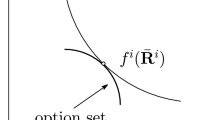Abstract
The incentive ratio measures the utility gains from strategic behaviour. Without any restrictions on the setup, ratios for linear, Leontief and Cobb–Douglas exchange markets are unbounded, showing that manipulating the equilibrium is a worthwhile endeavour, even if it is computationally challenging. Such unbounded improvements can be achieved even if agents only misreport their utility functions. This provides a sharp contrast with previous results from Fisher markets. When the Cobb–Douglas setup is more restrictive, the maximum utility gain is bounded by the number of commodities. By means of an example, we show that it is possible to exceed a known upper bound for Fisher markets in exchange economies.
Access this chapter
Tax calculation will be finalised at checkout
Purchases are for personal use only
Similar content being viewed by others
Notes
- 1.
Alternatively, we could assume the existence of a nonmanipulating agent who possesses at least a little bit of all commodities and who desires every commodity.
References
Adsul, B., Babu, C.S., Garg, J., Mehta, R., Sohoni, M.: Nash equilibria in fisher market. In: Kontogiannis, S., Koutsoupias, E., Spirakis, P.G. (eds.) SAGT 2010, pp. 30–41. Springer, Heidelberg (2010)
Aumann, R., Peleg, B.: A note on Gale’s example. J. Math. Econ. 1(2), 209–211 (1974)
Brainard, W.C., Scarf, H.: How to compute equilibrium prices in 1891. In: Cowles Foundation Discussion Papers 1272, Cowles Foundation forResearch in Economics, Yale University (2000)
Brânzei, S., Chen, Y., Deng, X., Filos-Ratsikas, A., Frederiksen, S., Zhang, J.: The fisher market game: equilibrium and welfare. In: Twenty-Eighth AAAI Conference on Artificial Intelligence (2014)
Chen, N., Deng, X., Tang, B., Zhang, H.: Incentives for strategic behavior in fisher market games. In: AAAI Conference on Artificial Intelligence (2016)
Chen, N., Deng, X., Zhang, H., Zhang, J.: Incentive ratios of fisher markets. In: Czumaj, A., Mehlhorn, K., Pitts, A., Wattenhofer, R. (eds.) Automata, Languages, and Programming. LNCS, pp. 464–475. Springer, Heidelberg (2012)
Chen, N., Deng, X., Zhang, J.: How profitable are strategic behaviors in a market? In: Demetrescu, C., Halldórsson, M.M. (eds.) Algorithms- ESA 2011. LNCS, pp. 106–118. Springer, Heidelberg (2011)
Curtis Eaves, B.: Finite solution of pure trade markets with Cobb-Douglas utilities. In: Manne, A.S. (ed.) Economic Equilibrium: Model Formulationand Solution, Part II. Solution Methods. Mathematical Programming Studies, vol. 23, pp. 226–239. Springer, Heidelberg (1985)
de la Fuente, A.: Mathematical Methods and Models for Economists. Cambridge University Press, Cambridge (2000). Cambridge Books Online
Mas-Colell, A., Whinston, M., Green, J.: Microeconomic Theory. Oxford University Press, Oxford (1995)
Mehta, R., Sohoni, M.: Exchange markets: strategy meets supply-awareness. In: Chen, Y., Immorlica, N. (eds.) WINE 2013. LNCS, vol. 8289, pp. 361–362. Springer, Heidelberg (2013)
Polak, I.: The Incentive Ratio in Exchange Economies. arXiv:1609.02423 [cs.GT] (2016)
Postlewaite, A.: Manipulation via endowments. Rev. Econ. Stud. 46(2), 255–262 (1979)
Press, W.H., Dyson, F.J.: Iterated prisoners dilemma contains strategies that dominate any evolutionary opponent. Proc. Natl. Acad. Sci. 109(26), 10409–10413 (2012)
Thomson, W.: Monotonic Allocation Mechanisms. Working Paper No. 116, University of Rochester (1987)
Yi, G.: Manipulation via withholding: a generalization. Rev. Econ. Stud. 58(4), 817–820 (1991)
Acknowledgments
Research funding through the Nanyang Technological University PhD research scholarship is gratefully acknowledged. I would like to thank Xiaohui Bei and Satoru Takahashi for discussions on the topic and many useful suggestions and comments on earlier versions of this manuscript. I also thank anonymous referees for helpful remarks. All remaining errors are of course my own.
Author information
Authors and Affiliations
Corresponding author
Editor information
Editors and Affiliations
Rights and permissions
Copyright information
© 2016 Springer International Publishing AG
About this paper
Cite this paper
Polak, I. (2016). The Incentive Ratio in Exchange Economies. In: Chan, TH., Li, M., Wang, L. (eds) Combinatorial Optimization and Applications. COCOA 2016. Lecture Notes in Computer Science(), vol 10043. Springer, Cham. https://doi.org/10.1007/978-3-319-48749-6_49
Download citation
DOI: https://doi.org/10.1007/978-3-319-48749-6_49
Published:
Publisher Name: Springer, Cham
Print ISBN: 978-3-319-48748-9
Online ISBN: 978-3-319-48749-6
eBook Packages: Computer ScienceComputer Science (R0)




